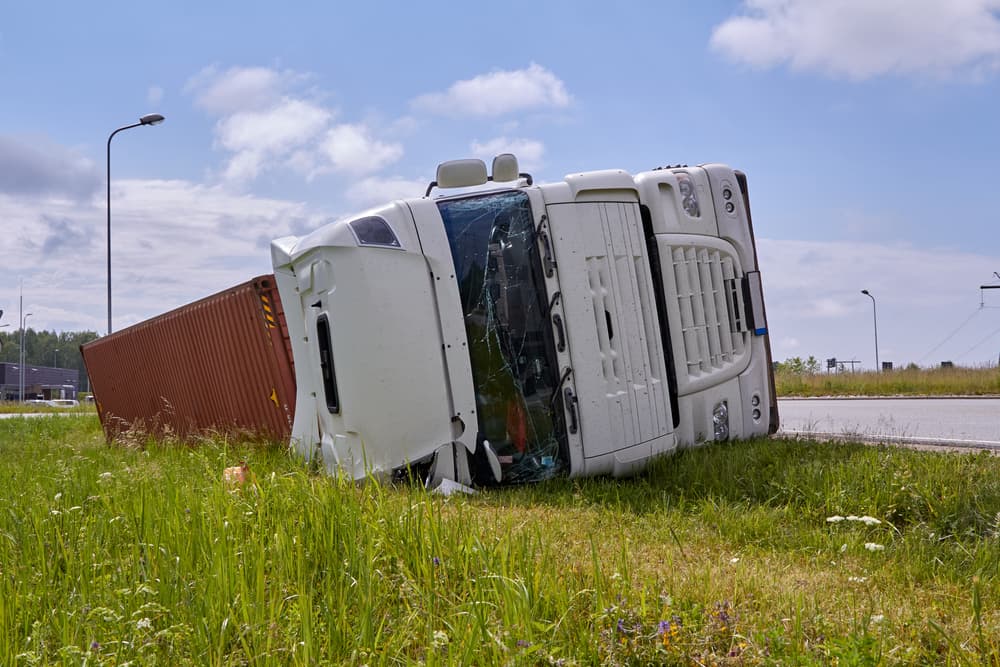
If you recently got hurt in a truck accident, you need a lawyer who understands how FMCSA regulations apply to your case. The Federal Motor Carrier Safety Administration (FMCSA) has established numerous regulations for trucking companies and their drivers to keep U.S. road users safe.
When these companies or their drivers violate these rules, they can cause devastating accidents. If you suffered preventable injuries in such an accident, recognizing and proving FMCSA rule violations could shape the outcome of your legal case. An experienced truck accident lawyer in New Port Richey fights for justice in FMCSA rule violation cases. Get the compensation you deserve.
What Does FMCSA Do?

FMCSA is an important government agency within the U.S. Department of Transportation. Its primary mission revolves around enhancing the operational safety of commercial motor vehicles, including large trucks and buses.
To achieve this goal, FMCSA creates and enforces regulations for the trucking industry. It also conducts safety research, oversees driver licensing, and manages financial responsibility policies.
Furthermore, FMCSA works with state and local enforcement agencies, motor carriers, safety advocates, and other stakeholders to promote safety in the transportation industry.
Common Types of FMCSA Rule Violations
FMCSA rules exist to make our roads safer. Unfortunately, FMCSA rule violations occur frequently. Many drivers and carriers break the rules due to pressure to meet delivery deadlines or cut operational costs. Such deviations range from the mishandling of hazardous materials to neglecting proper rest periods for drivers. Here are some common examples of FMCSA violations:
Hours of Service Restrictions
FMCSA’s hours of service (HOS) rules aim to reduce driver fatigue, a leading cause of accidents in the trucking industry. HOS regulations generally limit drivers to a maximum of 11 hours of driving daily after ten consecutive hours off-duty. Truckers cannot drive beyond the 14th consecutive hour after coming on duty, following ten hours off duty.
Another rule, the 60/70-hour limit rule, stipulates that truck drivers cannot operate more than 60 or 70 hours on duty over seven or eight consecutive days, respectively.
HOS rules also require a 30-minute break if more than eight hours have passed since the driver’s last off-duty or sleeper-berth period.
Common HOS violations include exceeding these driving or on-duty limits, not taking required breaks, and falsifying HOS logbooks.
Cargo Weight Limits
The FMCSA, in conjunction with state regulations, enforces weight limits for commercial vehicles to ensure road safety and infrastructure protection. The most common standard gross weight limit across federal highways is 80,000 pounds across a certain number of axles.
Weight limits can vary depending on the type of road and state regulations. Overloading is a common violation, which can lead to accelerated road wear, increased stopping distances, and increased risk of rollover.
Inspection and Maintenance Requirements
To ensure the safety of commercial vehicles, FMCSA mandates regular inspections and maintenance. Trucks must undergo periodic inspections to identify possible defects or deficiencies that could affect the safe operation of a vehicle. If a truck driver or other inspector discovers any such defects, they must conduct appropriate repairs before the vehicle can return to service.
Common violations in this category include failing to perform inspections, operating vehicles with known safety defects, and neglecting to make necessary repairs.
Drug and Alcohol Restrictions
The FMCSA has zero tolerance for drug or alcohol use among commercial vehicle operators. Truck drivers are subject to pre-employment, random, post-accident, reasonable suspicion, return-to-duty, and follow-up drug and alcohol testing.
Operating a commercial vehicle with a blood alcohol concentration of 0.04 or greater violates the law. Additionally, drivers cannot operate commercial vehicles within four hours of consuming alcohol.
Violations in this category often include testing positive for prohibited substances, refusing necessary tests, or not participating in the mandatory Drug and Alcohol Clearinghouse.
Recordkeeping Requirements
FMCSA mandates accurate and timely recordkeeping to track regulatory compliance. This includes requirements for HOS logs, vehicle inspection reports, maintenance records, and drug and alcohol testing results. Common violations in this category involve falsifying records, not retaining records for the appropriate duration, or failing to produce records upon request during audits or inspections.
Hazardous Materials Restrictions
Transporting hazardous materials (hazmat) entails satisfying additional regulations to ensure public safety. Hazmat carriers must obtain special permits, ensure their drivers have the correct endorsements, and comply with strict packaging, labeling, and documentation requirements.
Common hazmat violations include failing to properly label or package hazardous materials, not training employees in hazmat procedures, or operating without the necessary permits or endorsements.
Possible Consequences for FMCSA Violations
Trucking companies and their drivers are responsible for complying with FMCSA regulations to ensure the safety of their drivers, other road users, and the general public.
When a driver or company violates FMCSA regulations, they could face the following penalties or related consequences:
- Inspections and Audits: The FMCSA or its state partners might conduct on-site inspections or compliance reviews. These inspections might be routine, due to a specific tip or complaint, or due to patterns of violations.
- Fines: One of the most immediate consequences for violating FMCSA rules is the imposition of monetary fines. These fines are often substantial, varying based on the nature and severity of the violation.
- Out-of-Service Orders: For serious violations, the FMCSA might issue an out-of-service order. This order requires the immediate halt of all operations by the truck, driver, or trucking company until the violation gets corrected.
- Safety Rating Downgrades: Based on the findings of inspections and audits, the FMCSA could downgrade a carrier’s safety rating. A company with a poor safety rating might face more frequent inspections. It could also lose business, as many shippers and brokers are reluctant to hire carriers with poor safety records.
- CDL Suspensions or Revocations: The FMCSA can suspend or revoke the commercial driver’s licenses (CDLs) of individual drivers who violate certain trucking regulations.
- Penalties for Drug and Alcohol Violations: The FMCSA has strict rules about drug and alcohol use by commercial drivers. Substance use violations can lead to mandatory drug or alcohol testing, suspension of a driver’s CDL, or even criminal penalties in some cases.
- Litigation: In addition to administrative actions by the FMCSA, a trucking company that violates safety regulations might be vulnerable to lawsuits, especially if its violation contributes to an accident.
- Higher Insurance Rates: Violations or a record of non-compliance could lead to increased insurance premiums for the trucking company. This is especially likely if the trucking company is liable for an accident that requires an insurance payout.
- Loss of Business: Some businesses will not work with trucking companies with histories of FMCSA violations, fearing potential liability or simply wanting to ensure safety and reliability in their supply chains.
- Criminal Charges: In extreme cases involving willful violations or severe accidents, truck drivers or company officials could face criminal charges.
What Are Your Rights if You Get Hurt in an Accident With a Driver, Truck, or Carrier in Violation of FMCSA Rules?
If you sustain injuries in an accident involving an FMCSA rule violation, you could have several avenues to seek compensation for the harm you endured. These violations can provide strong evidence of wrongdoing, bolstering your claim and potentially increasing the compensation you can recover.
Here are some of the ways you could hold the other party accountable and seek a fair recovery for your truck accident injuries:
- A Trucking Company Insurance Claim: One of the primary sources of compensation for many truck accidents is an insurance claim against the trucking company. Given that these companies usually have sizable insurance policies, victims could recover significant compensation, especially if strong evidence indicates an FMCSA violation.
- Other Auto Insurance Claims: There are scenarios where another road user might be partially or entirely at fault for a truck accident, even if the driver or carrier violated FMCSA rules. In such instances, you may file an insurance claim against another road user. This claim will seek compensation from the insurance policy of the at-fault party, whether a car driver, motorcyclist, or even a pedestrian.
- A Product Liability Claim: In some truck accident cases, a defective truck component or other faulty piece of equipment contributes to the collision. If this is the case, you could pursue a product liability claim against the product’s designer, manufacturer, distributor, seller, or installer. Manufacturers of faulty parts are responsible for accidents and injuries that result from their products failing, and a product liability case could yield considerable compensation.
- A Personal Injury Lawsuit: In addition to insurance claims, you also have the right to file a personal injury lawsuit after a truck accident that injures you. This legal avenue might be especially beneficial if insurance compensation doesn’t fully account for your medical expenses, lost income, or other crash-related losses. A lawsuit directly targets the liable party, whether it’s the driver, the trucking company, or a third party, and seeks compensation for the full extent of the harm you suffered.
Proving an FMCSA Rule Violation
You need compelling evidence to file a truck accident claim arguing that a breach of FMCSA regulations contributed to the event.
When you work with a knowledgeable truck accident lawyer, they can conduct an investigation to identify and preserve evidence of possible FMCSA violations, such as:
- Driver Log Books: These record the hours a driver was on the road, ensuring they comply with HOS rules. Falsified or incomplete logs could indicate FMCSA violations.
- Electronic Logging Device (ELD) Data: ELDs are modern alternatives to paper logbooks. They automatically record driving hours and are usually harder for drivers or carriers to manipulate.
- Vehicle Maintenance Records: These can show if the driver or the trucking company failed to maintain the truck according to FMCSA regulations or neglected to address known issues.
- Driver Employment Records: Past infractions, training records, or a lack of proper qualifications could indicate wrongful hiring or retention by the trucking company.
- Truck Weight Tickets: Proof of cargo weight from highway weigh stations could confirm whether the truck exceeded appropriate weight limits.
- Eyewitness Testimony: Statements from other road users or bystanders could provide firsthand accounts of the truck driver’s erratic behavior, speeding, or other rule violations.
- Surveillance or Dashcam Footage: Videos can provide strong evidence showing the moments leading up to, during, and after the accident.
- Driver’s Medical Records: These records can show whether a driver was dealing with health issues, took medication, or had any other condition that might go against FMCSA driver regulations.
- Drug and Alcohol Test Results: Any positive tests post-accident could show a violation of FMCSA drug or alcohol use restrictions.
- Cargo Loading Records: Records could indicate that the driver or a loading team overloaded the truck or failed to properly balance or secure its cargo, making the truck more prone to accidents.
- Cell Phone Records: These could indicate whether the driver was texting, talking, or focusing on other distractions at the time of the accident.
- GPS Data: Travel data from GPS devices could provide insights into the truck’s speed, route, stops, and other pertinent details before the accident.
- Bills of Lading and Delivery Documents: These might reveal unrealistic delivery schedules that encourage drivers to speed or engage in other dangerous behaviors to keep their deliveries on time.
- Weather and Road Condition Reports: These reports do not directly prove FMCSA violations but could show that a driver did not adjust appropriately to adverse conditions as regulations mandate.
- Expert Testimony: Accident reconstruction experts, former FMCSA officials, or trucking industry insiders can provide insights into industry practices, regulatory breaches, and accident mechanics.
How Does a Violation of FMCSA Rules Affect Liability in a Truck Accident Case?

A violation of FMCSA rules can significantly influence the determination of liability in a truck accident case. Proving a truck driver or trucking company breached these federal safety regulations can serve as compelling evidence of wrongdoing, making it easier to establish fault.
For instance, if a driver exceeds hours of service limits and causes an accident due to fatigue, that direct violation could be pivotal in proving liability. A skilled personal injury attorney can work to identify these violations, gather the necessary evidence, and skillfully argue the case on your behalf. Their knowledge of FMCSA rules and how to apply them in court could greatly improve your chances of securing fair compensation for the harm you suffered.



